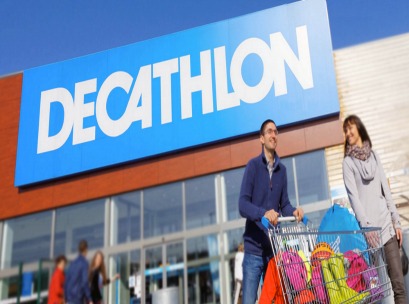 International sporting goods retailer Decathlon has announced its highly anticipated bricks-and-mortar expansion, securing a warehouse flagship in Sydney’s inner-west.
International sporting goods retailer Decathlon has announced its highly anticipated bricks-and-mortar expansion, securing a warehouse flagship in Sydney’s inner-west.
The French-headquartered company has signed a lease for a warehouse in Tempe on land owned by Swedish furniture retailer Ikea and is working towards an opening date sometime in October before embarking on a broader plan to open around 100 stores.
The venture will be overseen by Australian CEO Olivier Robinet, a company veteran who has previously spearheaded Decathlon’s Italian expansion, and CFO Sylvain Baudens, who has been in Australia laying the groundwork for the expansion since the beginning of last year.
Construction on the Tempe site is already underway and discussions to secure a Melbourne location are understood to be in final stages. The company has earmarked 2018 for broader expansion beyond its first flagship, revealing that they are actively looking for suitable opportunities across the country.
The Tempe flagship fits the company’s 3,000 – 4,000sqm criteria, right down to the size of each car space, and is expected to stock 7,000 product lines across 70 sporting categories when complete.
Products will be tailored to the local market and will be able to be tested in store in activity areas, with current concept imagery detailing a mixed-use basketball court attached to the warehouse.
Describing his rollout strategy as “lightweight and low cost”, Robinet said that they will look to disrupt the market on a high-quality, low price model that leverages a global research and logistics network.
Decathlon has been testing the Australian market with an e-commerce store for over a year with minimal fanfare, but it is now investing in community programs in an effort to embed its brand in the local market.
Robinet told Inside Retail that he expects to finalise lease agreements for more locations before the opening of the Tempe flagship, but doesn’t expect to make any further announcements to the market until that time.
“We’re doing it step by step, we won’t wait to sign contracts, but let’s open the first one and then next year we will open in Melbourne.”
Robinet says he’s aiming to replicate his work expanding Decathlon into Italy and has a “dream” rather than target of around 100 stores by 2030.
Current plans involve building sales volume locally with an initial footprint of ten stores ahead of a faster paced expansion plan. Omnichannel functionality is already being built into the expansion with click-and-collect set to be functional from launch alongside next day delivery services.
“If we are successful with our first, second, third one we will continue to develop,” Robinet said. “When it’s good we want to go fast, but for us it’s a marathon not a 100 metre sprint – we aren’t Usain Bolt.”
Decathlon to have “massive impact” on market
The physical entry of the so-called ‘category killer’ brand, which maintains more than 1150 stores in nearly 30 countries, is anticipated by analysts to have a significant impact on the Australian market.
Super Retail Group (SRG), which controls 28.2 per cent of the Australian sporting and camping goods market in Australia on IBISWorld numbers, is widely considered to be in the firing line alongside RCG’s Athlete’s Foot, Kathmandu and discount department store brands like Big W and Kmart.
But Queensland University of Technology associate professor Gary Mortimer believes SRG are most vulnerable, predicting that Decathlon will market products above Kmart prices, but with a level of quality that could undercut SRG’s well-established position.
“Decathlon will have a massive impact on the market and if consumers aren’t that brand loyal a retailer like Decathlon represents real value,” Mortimer said.
Robinet wasn’t shy about comparing existing market offers to Decathlon’s range, noting that for the $240 price tag on a pair of Asics running shoes at Rebel Sport consumers could get an entire outfit, smart phone armband and watch included, and still have $9 to spare.
Super Retail Group managing director Peter Birtles and Rebel/Amart sports managing director Erica Berchtold have both gone on the record in the last twelve months expressing their belief that SRG doesn’t compete directly with Decathlon – but analysts aren’t so confident.
Research conducted by Citi analyst Craig Woolford last year found that SRG could lose 3.7 per cent of its sales within a decade from the effects of price competition brought on by Decathlon.
Mortimer also believes that while the likes of Lululemon and Lorna Jane will likely retain upmarket customers, SRG can’t bank on their shopping centre locations to secure its market position.
Australian Sporting Goods Association chief executive Shannon Walker said that Decathlon will face a range of “significant challenges”, but welcomed the brand’s expansion and its likely affect on the sporting goods market.
“Like many retailers from overseas, Decathlon will face significant challenges operating in Australia, including high wages, rents and transport costs,” Walker said. “Of course, they’ll also be up against many beloved and well-regarded retail brands in Australia, who enjoy fierce customer loyalty. No doubt this new competition will encourage all retailers in the sporting and active lifestyle space to improve even more.”
Decathlon are intent on increasing consumer spend in the sporting goods market in general, having outlined plans to invest significantly in sporting events and active lifestyle programs as part of a broader push to combat shifting consumer attention towards entertainment.
Robinet and Baudens have outlined Netflix as a key competitor, with data from Roy Morgan indicating that spend on entertainment outpaced consumer goods last year, growing by $10 billion year-on-year.
Access exclusive analysis, locked news and reports with Inside Retail Weekly. Subscribe today and get our premium print publication delivered to your door every week.






